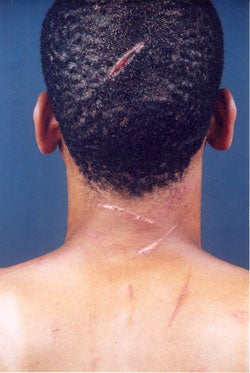Widespread violence and discrimination against gay men and people living with HIV/AIDS in Jamaica is undermining government measures to combat the country’s fast-growing epidemic, Human Rights Watch said in a new report released today.
The 79-page report, “Hated to Death: Homophobia, Violence, and Jamaica’s HIV/AIDS Epidemic,” documents extensive police persecution of people suspected of homosexual conduct, as well as sex workers and people living with HIV/AIDS. Gay men and people living with HIV/AIDS face serious violence, and are often forced to abandon their homes and communities. Health workers often provide them with inadequate healthcare or deny them treatment altogether.
Many people in Jamaica still believe that HIV is transmitted by air or casual contact. Widespread homophobia and discrimination are effectively undermining the government response to HIV/AIDS, Human Rights Watch said.
“Until Jamaica addresses the epidemic of homophobic violence, it will have no hope against the epidemic of HIV/AIDS,” said Rebecca Schleifer, researcher with Human Rights Watch’s HIV/AIDS Program and author of the report. “If the Jamaican government is serious about fighting the country’s AIDS epidemic, it should stop promoting brutality against gay men and lesbians and start protecting them from abuse.”
 |
| This man was beaten with sticks and cut with machetes by assailants who perceived that he was gay. Violent attacks against gay men are common in Jamaica. © 2004 Jamaica Forum for Lesbians, All-Sexuals, and Gays |
Jamaica’s Ministry of Health has taken steps to combat discrimination against people living with HIV/AIDS or at risk of contracting the virus. But discriminatory laws and state practices are undermining these important efforts. Jamaica’s Victorian-era sodomy laws, which criminalize consensual sex between adult men, are used to arrest “peer educators” who provide HIV/AIDS information and condoms to other gay men.
Police extort money and sex from gay men as well as sex workers, sometimes using the mere possession of condoms — a key tool in HIV prevention — as an excuse to harass or arrest both them and the AIDS educators who work with them. Discrimination against people living with HIV/AIDS poses serious barriers to obtaining necessary medical care and drives many from seeking health services for themselves and their children.
An estimated 1.5 percent of Jamaican adults are living with HIV/AIDS, the third largest population of people living with HIV/AIDS in the Caribbean (after Haiti and the Dominican Republic). According to government figures, the epidemic is on the increase. In June, Jamaica launched an ambitious project to provide antiretroviral drugs to people living with HIV/AIDS and to address underlying human rights violations that are driving the epidemic.
“Jamaica’s ambitious HIV/AIDS programs are bound to fail unless the government eliminates the discriminatory laws and abusive practices that undermine its prevention and treatment efforts,” said Schleifer. “Protecting human rights is a matter of life and death for thousands of Jamaicans affected by AIDS.”
Human Rights Watch called on the Jamaican government to reform the criminal justice system to protect all citizens against torture and abuse. It also called on the government to repeal the sodomy law, end arrests and prosecutions based on adult consensual homosexual conduct, ensure protection of HIV/AIDS outreach workers, and protect people living with HIV/AIDS against discrimination.






